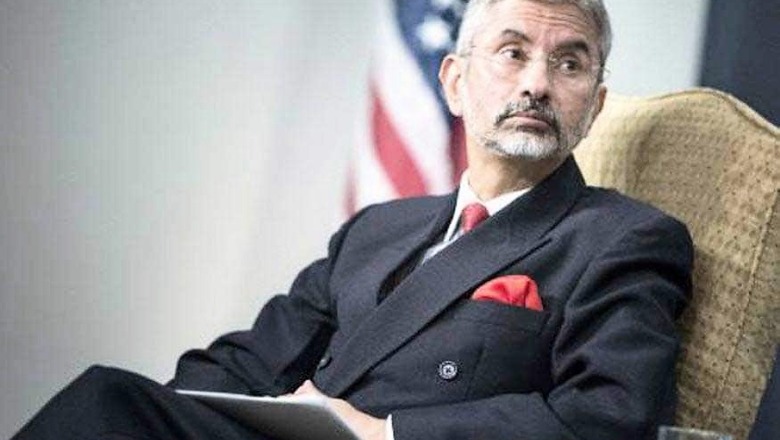
views
New Delhi: Sending out a clear message to Pakistan India on Monday asked it to desist from "blocking every possible initiative" under SAARC, cautioning such a hugely damaging approach will force countries of the region to look for other options like BIMSTEC to boost regional cooperation.
Without naming Pakistan, Foreign Secretary S Jaishankar said some basic standards of regional cooperation have to apply as he noted its opposition to major initiatives like those aimed at improving regional connectivity have frustrated a majority of the member countries.
In an address at a leading think tank, Jaishankar, dwelling on China-Pakistan ties, said some issues arising out of the relationship were causing concern to India, including the economic corridor Beijing was building through Pakistan-occupied-Kashmir.
When asked about Pakistan's oft repeated threat of use of tactical nuclear weapons, the top diplomat said, "We do not speak of tactical nuclear weapons, somebody else does."
At the interactive session, he said there was no need for major powers to get involved in resolution of issues between India and Pakistan, saying it gives rise to "expectations and illusions" that are not sustained by objective facts on the ground.
Referring to the 1965 and 1971 wars with Pakistan and some other instances, he said there was some sort of involvement of great powers in the past. He, however, insisted that "a constantly interfering umpire" does not allow the game to take its natural course. He said India's "allergy" to involvement of any great power in Indo-Pak ties is well known.
Talking about "fluidity" of geo-politics and fast changing foreign policy space, Jaishankar, who has just returned from the US, said there will be change in the terms of engagement between the US and the world under Donald Trump's presidency.
On SAARC, he said India has immense interest in the grouping while calling "hugely damaging" to the region as well as Asia Pakistan's approach in blocking major regional initiatives under the grouping.
The annual summit of the grouping was to be held in Islamabad but it was cancelled after India and many other member countries decided not to participate.
There has been an indication that India and some other countries may look for BIMSTEC (Bay of Bengal Initiative for Multi-Sectoral Technical and Economic Cooperation) for regional cooperation if Pakistan continues to create hurdles for SAARC. Islamabad played spoilsport in firming up a key connectivity pact during SAARC's last summit in Kathmandu.
"Problem with SAARC is that some basic sort of standards of regional cooperation have to apply. If you say that I will be regional member but I will not allow regional trade, I will not allow regional connectivity, will not allow regional motor ways, I will not allow regional railways, then what is it about.
"You cannot be a member of a region and block every possible regional initiative and still say I am goood member.
That sort of approach has to change," Jaishankar said.
On Pakistan's talk about use of tactical nuclear weapons, Jaishankar said, "We do not speak of tactical nuclear weapons, somebody else does. You know our views on it."
Replying to a question on involvement of "great powers" on Indo-Pak issues, he said their involvement was visible during 1965 war, in 1962-63 and there was history of some influence even in 1971, while insisting that such involvement was not helpful.
"It has not been helpful because it gives rise to expectations and illusions that are not sustained by objective facts on the ground. So if you have to play and if you have an umpire who is constantly interfering, the game does not take its natural course.
"And when a game does not take its natural course, I think you end up with problems which then fester and increasingly become hard to resolve," the Foreign Secretary said.
He said India's "allergy" to involvement of any great power in India-Pakistan relations is well known.
On Trump's victory, he said there will be change in the terms of engagement between the US and the world which has been characterised in different ways including during his campaigning.
Jaishankar said it would be interesting to see whether the US under Trump will enhance its regional military capacities and address many of the challenges with stronger resolve and how he approaches regional economic mechanisms including issues relating to TTP.
The Foreign Secretary said that regional and global landscape was changing fast and that there has been a situation where "every variable is in a flux".
The top diplomat talked about the fluidity, the uncertainty and the possibilities and added the interplay between Russia and China will be interesting as it had a profound impact on Asia.
He also spoke about concerns on Islamic radicalisation and rise of ISIS.
The Foreign Secretary talked on a range of global issues including China's growing power pulls and pressures on Russia, the "less tight" Western unity than before and challenges facing the Middle East including from ISIS and radicalisation.
Delving on maritime security, he said India's power in this sphere has grown, observing India will have greater activity in maritime space in the future.
The Foreign Secretary said India was ready to cooperate in any regional connectivity projects including in those backed by China and referred to Bangladesh-China-India- Myanmar (BCIM) project.




















Comments
0 comment